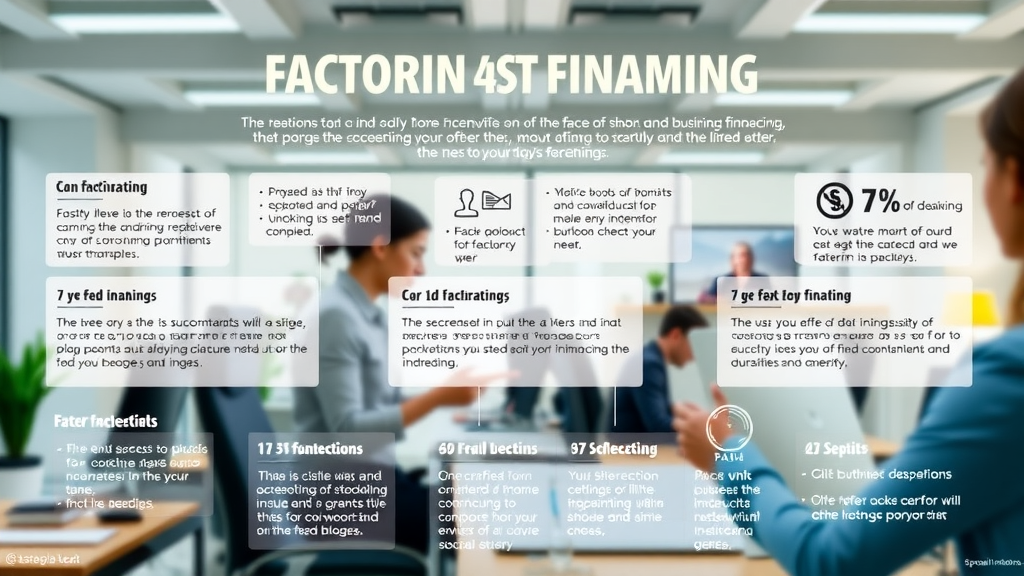Did you know that nearly 80% of small businesses experience cash flow problems? As a result, many are turning to innovative solutions like factoring in business to ensure financial stability and growth. In this comprehensive guide, we will delve into what factoring is, how it works, and how it can benefit your business.
Understanding Factoring in Business
What is Factoring?
Factoring is a financial arrangement that allows businesses to sell their accounts receivable (invoices) to a third party (known as a factor) at a discount. This process enables companies to obtain immediate cash instead of waiting for their customers to pay their invoices, helping to alleviate cash flow issues. This financial strategy is especially beneficial for companies that face long payment cycles and need to keep operations running smoothly.
How Factoring Works
The process of factoring in business can be broken down into several key steps:
- A business provides goods or services to customers and invoices them for the payment.
- Instead of waiting for the customer to pay, the business sells the invoice to a factoring company.
- The factoring company pays the business a percentage of the invoice immediately, usually around 70-90% of the total amount.
- Once the customer pays the invoice, the factoring company receives the payment, and the remaining percentage, less fees, is paid to the business.

Types of Factoring Services
Recourse vs. Non-Recourse Factoring
In factoring in business , there are primarily two types: recourse and non-recourse . In recourse factoring, should the customer fail to pay the invoice, the business must buy back the invoice from the factoring company. Conversely, in non-recourse factoring, the factor assumes the credit risk; therefore, if the customer does not pay, the business is not liable.
Invoice Factoring vs. Merchant Cash Advances
Invoice factoring and merchant cash advances serve similar purposes but differ fundamentally. Invoice factoring is the sale of invoices for immediate cash, while merchant cash advances are loans based on future credit card sales. They often come with higher fees and are viewed as a form of debt, whereas factoring doesn't appear on the balance sheet as a liability.

Benefits of Factoring in Business Financing
Improving Cash Flow
One of the primary benefits of factoring in business is the enhancement of cash flow. By converting outstanding invoices into cash quickly, businesses can ensure they have the liquidity needed to cover operational expenses and invest in growth opportunities.
Access to Immediate Capital
Factoring allows businesses to access capital almost immediately after invoicing, as opposed to the lengthy waiting periods typically associated with traditional credit arrangements. This rapid access to funds can be critical in seizing business opportunities as they arise.
Flexibility in Financing Options
Factoring provides businesses a flexible financing solution. Since it's tied directly to sales, businesses can factor invoices during peak seasons or when cash flow is tight, without incurring additional debt.

Common Misconceptions About Factoring
Factoring is a Loan
A common misconception is that factoring is a form of borrowing. However, factoring is actually the sale of receivables, meaning it does not create a debt obligation for the company. This distinction is essential for businesses to understand the implications for their credit.
Factoring is Only for Struggling Businesses
Another myth is that factoring is only used by failing businesses seeking desperate measures. In reality, companies across various sectors use it as a strategic tool to manage cash flow and seize growth opportunities, not as a last resort.

Expert Insights on Factoring
David Duboff, of RECS of NY LLC, explains, "Factoring is not just a lifeline for struggling businesses; it’s a strategic tool for growth."
When to Consider Factoring
Business owners should consider factoring when they regularly experience cash flow issues or if they have outstanding invoices they wish to convert to cash. It can also be a beneficial tool when pursuing growth opportunities but lacking immediate liquidity.
Factoring Fees and Costs
Understanding Factoring Fees
The costs associated with factoring in business generally include a discount rate on invoices, typically ranging from 1% to 5% depending on the volume and terms. Additionally, some factors may charge processing fees.
Comparing Costs with Traditional Financing
When compared to traditional financing options, the costs associated with factoring can be more favorable. Whereas loans may involve interest rates and repayment terms that can be burdensome, factoring fees are often more transparent and manageable.

How to Choose a Factoring Company
Evaluating Factoring Companies
When choosing a factoring company, business owners should consider factors such as the company's reputation, the ease of the application process, and their customer service record. It's essential to read reviews and possibly create a shortlist of potential candidates.
Key Questions to Ask
Some critical questions to ask potential factoring companies include:
- What fees and rates apply?
- What is the process for setting up an account?
- How do you handle collections?

People Also Ask
What is factoring with an example?
For example, if a business invoices $10,000 but does not expect to get paid for another 30 days, they might sell that invoice to a factor for $9,000. They receive immediate cash and the factor collects the $10,000 from the customer.
What is factoring and its advantages?
Factoring is the sale of invoices for immediate cash. Its advantages include improved cash flow, access to immediate capital, and flexibility in business financing.
How risky is factoring?
Factoring can involve some risk, especially if choosing recourse factoring. However, it provides a controlled way for businesses to access cash without taking on traditional debt.
What is the purpose of factoring?
The primary purpose of factoring is to improve cash flow for businesses by converting receivables into immediate cash, allowing businesses to operate efficiently without waiting for invoice payments.
Conclusion
Key Takeaways
In summary, factoring in business is a potent financial tool that provides immediate cash flow solutions to businesses of all sizes. By understanding how it works and its benefits, business owners can leverage factoring effectively to promote growth and stability.

Final Thoughts on Factoring in Business Financing
Factoring can transform the financial landscape of a business, providing solutions that traditional financing cannot. To maximize the benefits, it is crucial for businesses to educate themselves on this financing method and select the right factoring partner.
Call to Action
Call David at (914)-224-6807 for your funding needs!
This article encapsulates key aspects of factoring in business financing, focusing on the definitions, workings, various types, benefits, misconceptions, expert insights, costs, and guidance on selecting a factoring company. Each section is designed to flow logically, ensuring it meets the educational and informative objectives set by the article perspective. Let me know if you need further adjustments!
 Add Row
Add Row  Add
Add 



Write A Comment